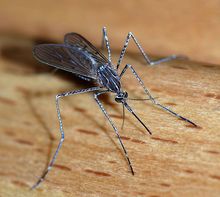An unimmunized horse in Escambia County was recently euthanized because it contracted the mosquito-borne Eastern Equine Encephalitis (EEE).

New case of mosquito-borne EEE
According to the Escambia County Department of Health, unimmunized horses throughout the county are at risk for mosquito-borne Eastern Equine Encephalitis.
According to the Escambia County Department of Health, unimmunized horses throughout the county are at risk for this disease. Horse owners are encouraged to keep current all equine immunizations for mosquito-borne diseases.
To protect horses from the effects of this disease, vaccinations should be current and delivered on a frequency of two times each year, every six months in consultation with a local veterinary professional.
In horses, the clinical presentation of EEE includes the following: apprehension, depression, elevated temperature, head shaking, muscle twitching, incoordination, weakness of hind limbs, inability to stand, aimless wandering, head pressing and listlessness.
EEE was first recognized in Escambia County, Florida in 1937.
While EEE rarely infects humans, transmission of the virus to humans is possible from the bite of an infected mosquito. Human signs and symptoms of EEE infection can include sudden onset of headache, high fever, chills, and vomiting.
The illness may then progress into disorientation, seizures, and coma. Severe cases of EEE infection in humans can lead to brain damage or death. Persons experiencing symptoms of a mosquito-borne disease should seek immediate medical care.
